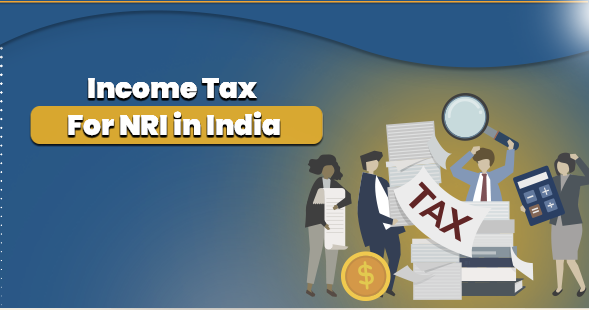NRI Income Tax Compliance Help Centre in India
Page Contents
FREQUENTLY ASKED QUESTIONS ON TAX COMPLIANCE ON NRI -HELP CENTRE
Q.: What exactly is a Non-Resident Indian (NRI)?
A “Non-Resident” is someone who does not live in India. An individual’s residential status in a given year determines whether the individual is a Resident or a Non-Resident for that year.
As a result, an individual’s residential status must be determined each year. Read on for more information.
Q.: How do I find out what my legal status is in India?
You are considered a “Resident in India” for a financial year if you spent
- at least 182 days during the financial year; or
- at least 60 days during the financial year and a total of 365 days in the preceding four years.
There are a few exceptions to the 60-day rule, in which case only the first condition’s test is performed:
- If you are an Indian citizen who left India during the fiscal year to work as a crew member on an Indian ship or for other reasons.
- If you are a Person of Indian Origin (PIO) or an Indian citizen visiting the country.
If none of the above two conditions are met, the individual is said to be an NR in that tax year.
A resident individual is treated as RNOR if he/she satisfies any one of the following conditions:
- He/she has been an NR in nine out of ten tax years preceding the tax year for which residential status is being determined.
- His/her physical presence in India is less than or equal to 729 days during seven tax years preceding the tax year for which residential status is being determined.
A resident individual not satisfying both of the above conditions is treated as ROR.
As a result, if you do not meet any of the aforementioned criteria, you are a Non-Resident.
Q.: Do non-resident Indians have to pay taxes in India?
The answer is a resounding YES. Following the determination of your residence status under the Income Tax Act, 1961, the next stage is to assess whether your income is taxable in India based on your residence status.
- For Resident Individuals: Your global income is taxable in India, which means that income earned in India or elsewhere is taxable in India.
- Non-Resident Indians: Only income earned or accrued in India, or deemed to be earned or accrued in India, is taxable in India. As a result, your income from any country other than India is not taxable in India.
Q.: I am an Indian citizen who works outside of India. Because of the pandemic, I was able to work from home and returned to India.
Ans:
(i)My stay in India will exceed 182 days during fiscal year 2020-21. I receive my salary in a foreign bank account and pay taxes in a foreign country. Is it necessary for me to pay taxes in India?
Ans: Yes, you will be considered a resident Indian for the fiscal year 2020-21. Then, based on the amount of days you spent in India in the previous years, you must determine if you are ROR or RNOR.
(ii) During the fiscal year 2020-21, I will spend more than 182 days in India. I left India for the purpose of employment in F.Y. 2017-18; prior to that, I was just a resident Indian.
I receive my wage in a foreign bank account and pay taxes in another nation. Is it true that I have to pay taxes in India?
Ans: You will be classified as a ROR, and your worldwide earnings will be taxed in India. Based on tax treaties in both countries, you can claim a foreign tax credit or relief for taxes paid outside of India.
(iii) During financial year 2020-21, I will be in India for more than 182 days. Previously, every year since financial year 2010-11, I spent three weeks in India. I receive my salary in a foreign bank account and pay taxes in a foreign country. Is it necessary for me to pay taxes in India?
You will be classified as an RNOR. Your Indian income and any foreign income derived from a business controlled from India or a profession established in India will be taxable.
(iv) During financial year 2020-21, I will be in India for more than 182 days. In India, my status is ROR. I receive a salary in my foreign bank account, but I do not pay taxes in the foreign company because there is no income tax in that country.
Then you must pay a tax in India.
(v) My stay in India in the relevant fiscal year is more than 60 days but less than 120 days, and my stay in India in the preceding four years is more than 365 days. I have no desire to return.
Ans: For the fiscal year 2020-21, you will be regarded a resident Indian. Then, based on the amount of days you spent in India in the previous years, you must determine if you are ROR or RNOR.
(vi) Stay in India is longer than 60 days but less than 120 days, and I have spent more than 365 days in India in the previous four years. I’m now in India and will return soon.
You will be classified as a non-resident. Taxable income will only be earned and received in India.
(vii) My stay in India is longer than 120 days but less than 182 days, and my stay in India over the previous four years exceeds 365 days. I came to India on a visit, and my Indian income exceeds INR 15 lakh.
You will be classified as an RNOR. Your Indian income, as well as any foreign income derived from a business or profession established in India, will be taxable in India.
(viii) My stay in India is longer than 120 days but less than 182 days, and my stay in India over the previous four years exceeds 365 days. I am on a visit to India, and my Indian income is less than INR 15 lakh.
You’ll be classified as a Non-resident Indian. Taxable income will only be earned or received in India.
Read our articles:How to file a return of TDS onlineZ
- New TDS deduction No cash transactions exceeding 1 Crore -Section 194N
- Extention of TDS/TCS statement filing
Q If it is more than 60 days but less than 120 days, and my previous four-year stay in India is more than 365 days. I’m now in India and will return soon.
Ans: For the fiscal year 2020-21, you will be regarded a resident Indian. Then, based on the amount of days you spent in India in the previous years, you must determine if you are ROR or RNOR.
Q.: I am an Indian national living in the India. I am an attorney with a respectable firm in India. In the United Arab Emirates, I also receive consulting fees. In fiscal year 2020-21, I did not travel to India. In India, I have a salary of more than INR 15 lakh.
Ans: You will be considered an RNOR, and all of your Indian income, as well as income from this consultancy service in the UAE, will be taxable in India.
Q.: I am an Indian citizen living in the India. I am a lawyer with a professional firm in India. In the India, I am paid for my consulting services. During my visit to India in fiscal year 2020-21, I stayed in India for more than 120 days. I have an income in India of more than INR 15 lakh from my savings and investments in India.
Ans: You will be considered an RNOR, and all Indian income, as well as income from this consultancy service in the United States, will be taxable in India.
Q.: I am not a permanent resident of the India. What are the requirements for filing my Income Tax Return in India?
In most cases, you must file your income tax returns if.
- Your total income in India exceeds the basic exemption limit of 2,50,000.
- You are entitled to a reimbursement for unduly deducted TDS on interest, rent, and other items.
- You wish to take advantage of the loss carryforward benefit or offset your losses with gains.

Q.: Do I have to be present in India when I file my ITR?
No, it’s not true. To file and validate your income tax returns, you do not need to be physically present. You can file your tax return online from any location on the planet.
Your ITR can now be e-verified from anywhere. Within 120 days of filing your ITR, you can send a signed copy of ITR-V to the CPC Income Tax Department in Bengaluru or e-verify it.
Q.: I am a non-resident; will I be eligible for the basic exemption limit?
Yes, A non-resident can also claim the basic exemption limit. However, if your only source of income is Short Term Capital Gains [section 111A] or Long Term Capital Gains, such an exemption is not available because they are taxed at a higher rate.
Similarly, if your primary source of income is from special-rate income, like as lottery winnings, the basic exemption level will be unavailable.

